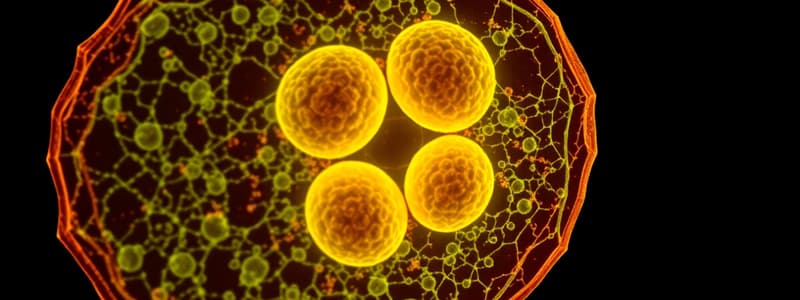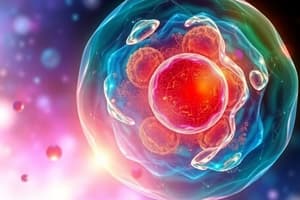Podcast
Questions and Answers
What is the role of the mitochondrion in a cell?
What is the role of the mitochondrion in a cell?
- Regulates cell division
- Produces energy through cellular respiration (correct)
- Site of photosynthesis
- Controls cellular transport
Which component of the cell is primarily responsible for controlling what enters and exits the cell?
Which component of the cell is primarily responsible for controlling what enters and exits the cell?
- Cytoplasm
- Cell membrane (correct)
- Golgi Apparatus
- Nucleus
What happens to the chromosome number during meiosis?
What happens to the chromosome number during meiosis?
- It remains the same as the parent cell
- It doubles compared to the parent cell
- It is halved compared to the parent cell (correct)
- It increases by one
Which statement about cell theory is NOT true?
Which statement about cell theory is NOT true?
In which part of the cell does photosynthesis occur?
In which part of the cell does photosynthesis occur?
What is the process used by cells to obtain water?
What is the process used by cells to obtain water?
What happens to an animal cell placed in a highly salty solution?
What happens to an animal cell placed in a highly salty solution?
What distinguishes plant cells from animal cells regarding water intake?
What distinguishes plant cells from animal cells regarding water intake?
Which of the following transport processes does not require energy?
Which of the following transport processes does not require energy?
Which example is not related to the concept of diffusion?
Which example is not related to the concept of diffusion?
What is the primary function of hydrolytic enzymes found in lysosomes?
What is the primary function of hydrolytic enzymes found in lysosomes?
Which characteristic differentiates prokaryotic cells from eukaryotic cells?
Which characteristic differentiates prokaryotic cells from eukaryotic cells?
What is the role of sclerenchyma cells in plants?
What is the role of sclerenchyma cells in plants?
What is true about both prokaryotes and eukaryotes?
What is true about both prokaryotes and eukaryotes?
What best describes diffusion?
What best describes diffusion?
What is the main product of glycolysis?
What is the main product of glycolysis?
What type of respiration occurs in Baker's yeasts when they are added to bread dough?
What type of respiration occurs in Baker's yeasts when they are added to bread dough?
What causes muscle pain during strenuous activities when oxygen supply is low?
What causes muscle pain during strenuous activities when oxygen supply is low?
What is the final acceptor of hydrogen in cellular respiration?
What is the final acceptor of hydrogen in cellular respiration?
What factors affect successful autoclaving?
What factors affect successful autoclaving?
What is the primary purpose of a selective culture medium?
What is the primary purpose of a selective culture medium?
Why is sunlight not effective for sterilization?
Why is sunlight not effective for sterilization?
Which stage of the cell cycle includes the substages G1, S, and G2?
Which stage of the cell cycle includes the substages G1, S, and G2?
What role does mitosis play in living organisms?
What role does mitosis play in living organisms?
What is the primary function of meiosis in organisms?
What is the primary function of meiosis in organisms?
What is the main function of the pilus in bacterial cells?
What is the main function of the pilus in bacterial cells?
Which structure is primarily responsible for protein synthesis in a bacterial cell?
Which structure is primarily responsible for protein synthesis in a bacterial cell?
What is the function of the flagellum in bacterial cells?
What is the function of the flagellum in bacterial cells?
Which of the following statements best describes a plasmid?
Which of the following statements best describes a plasmid?
Where is the bacterial DNA located within the cell?
Where is the bacterial DNA located within the cell?
What is the primary function of exocytosis in cells?
What is the primary function of exocytosis in cells?
Which process involves white blood cells engulfing bacteria?
Which process involves white blood cells engulfing bacteria?
Which of the following structures is found in plant cells but not in animal cells?
Which of the following structures is found in plant cells but not in animal cells?
Which type of endocytosis specifically involves the uptake of liquids and small particles?
Which type of endocytosis specifically involves the uptake of liquids and small particles?
How is the magnification calculated if the objective lens is set at 40x and the eyepiece is 8x?
How is the magnification calculated if the objective lens is set at 40x and the eyepiece is 8x?
What is the total mass of the object measured using the triple beam balance?
What is the total mass of the object measured using the triple beam balance?
How much liquid was drained from the burette based on the readings?
How much liquid was drained from the burette based on the readings?
What does the third beam setting on the triple beam balance indicate?
What does the third beam setting on the triple beam balance indicate?
What is the initial reading on the burette before liquid is drained?
What is the initial reading on the burette before liquid is drained?
Which of the following observations can be concluded from the mass determination?
Which of the following observations can be concluded from the mass determination?
What happens to an animal cell in a hypotonic solution?
What happens to an animal cell in a hypotonic solution?
What is the condition of a plant cell in a hypertonic environment?
What is the condition of a plant cell in a hypertonic environment?
Which statement is true regarding animal cells in different solutions?
Which statement is true regarding animal cells in different solutions?
What characteristic describes a plant cell in an isotonic environment?
What characteristic describes a plant cell in an isotonic environment?
What condition results when a plant cell is put in a hypotonic environment?
What condition results when a plant cell is put in a hypotonic environment?
Flashcards are hidden until you start studying
Study Notes
Cell Theory
- Three major ideas: all living things are made of cells, cells are the fundamental unit of life, all cells arise from pre-existing cells.
- Mitosis results in daughter cells with the same chromosome number as the parent cell; meiosis produces daughter cells with half that number.
Cell Structure and Parts
- Key cell components include mitochondrion (energy production), nucleus (cell manager), cytoplasm (fluid inside), cell membrane (regulates entry and exit), Golgi apparatus (packages materials), and chloroplast (photosynthesis).
- Chloroplasts contain chlorophyll, essential for capturing sunlight for photosynthesis.
- The cell membrane acts as a barrier, controlling material exchange, while the nucleus oversees cell activities.
Transport Processes
- Diffusion refers to the movement of molecules from high to low concentration; examples include dissolving substances in water.
- Osmosis is the specific process of water movement through a semi-permeable membrane.
- Cells use passive transport (no energy) and active transport (energy required) to exchange materials with their environment.
Prokaryotes vs. Eukaryotes
- Prokaryotes lack membrane-bound nuclei and organelles, while eukaryotes possess these structures.
- Both cell types contain cell walls, membranes, and cytoplasm; plasmids are exclusive to prokaryotes.
Cellular Respiration
- The process by which cells convert food chemical energy into ATP; includes aerobic (with oxygen) and anaerobic (without oxygen) pathways.
- Glycolysis is the first step, breaking glucose into pyruvic acid.
- Anaerobic respiration in muscles leads to lactic acid production during strenuous activity, causing pain.
Mitosis and Meiosis
- Mitosis: four phases (prophase, metaphase, anaphase, telophase) enable tissue growth and cell replacement.
- Meiosis produces gametes for sexual reproduction, occurring in the gonads.
Bacterial Cell Structures
- Key components include chromosome, pilus (for genetic transfer), ribosome (protein synthesis), storage granule, flagellum (movement), plasmid (antibiotic resistance), cytoplasm, cell membrane, cell wall, and capsule.
Impact of Solutions on Cells
- Animal cells can undergo cytolysis in hypotonic solutions and plasmolysis in hypertonic solutions; remain unchanged in isotonic solutions.
- Plant cells become turgid in hypotonic environments, retain shape in isotonic solutions, and plasmolyze in hypertonic surroundings.
Cell Processes
- Exocytosis: release of hormones into the bloodstream.
- Receptor-mediated endocytosis: active absorption of molecules through vesicles.
- Phagocytosis: white blood cells engulfing bacteria.
- Pinocytosis: ingestion of liquids and small particles by cells.
Distinguishing Between Plant and Animal Cells
- Plant cells are characterized by chloroplasts, a large vacuole, and a cell wall.
- Animal cells have small vacuoles and centrioles.
Magnification and Measurement
- Total magnification can be calculated using the formula: MS = ocular lens magnification x objective lens magnification.
- A pipette is used for liquid transfer.
- Mass measurements can be determined using a triple beam balance; the sum of the values from the beams indicates the object's mass.
- Liquid volume can be measured using a burette by noting the difference in readings before and after draining.
Studying That Suits You
Use AI to generate personalized quizzes and flashcards to suit your learning preferences.




